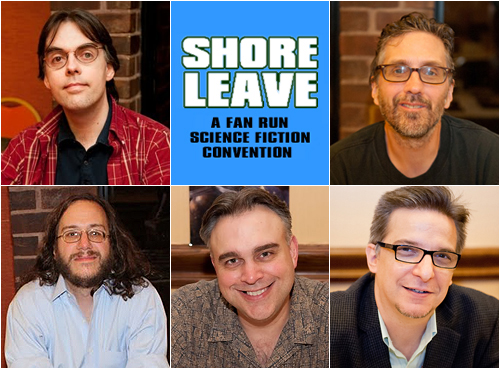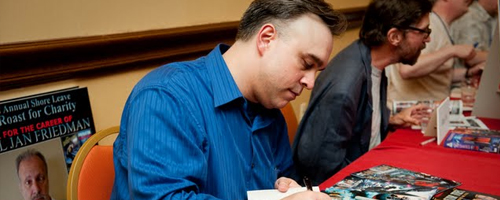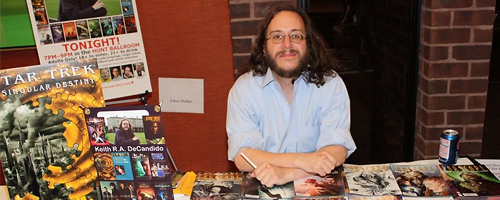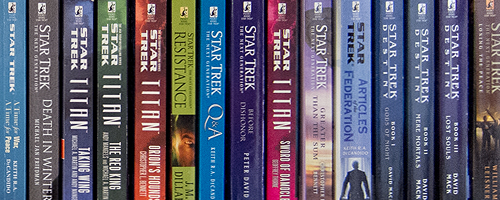Just a few weeks ago, we brought you a preview of this year’s 35th Annual Shore Leave Convention, which takes place in Hunt Valley, Maryland this August – and now, we have an inside look at the biggest Star Trek literature event of the year with five of the past decade’s most well-known Trek lit contributors – authors Christopher L. Bennett, Greg Cox, Keith R.A. DeCandido, David Mack, and former Pocket Books Trek editor Marco Palmieri!

Shore Leave 35 Preview with Christopher L. Bennett, Greg Cox, Keith R.A. DeCandido, David Mack, and Marco Palmieri
![]()
TrekCore: First of all – for those readers unfamiliar with the event – could you talk a little about the literary focus of the Shore Leave convention?
David Mack: Unlike many fantasy and science-fiction conventions, whose guest rosters tend to be dominated by media guests (i.e., actors), the majority of Shore Leave’s featured guests are authors. Most of us are well established as writers of Star Trek tie-in fiction, though most of us also have several non-Star Trek credits, as well. For fans of literary science fiction and fantasy, Shore Leave is the best con of its kind on the east coast of the U.S.
Keith R.A. DeCandido: For a long time, the primary literary focus of Shore Leave was on Star Trek fiction, but it’s expanded over the past few years, partly due to many long-time Star Trek novelists expanding their portfolio. The works of regular Shore Leave guests Peter David, Michael Jan Friedman, Robert Greenberger, Aaron Rosenberg, and others is the focus, with a recent addition of other authors local to the Baltimore area.
Christopher L. Bennett: There’s always a mass autograph session with all of the author guests on the first night of the con, called “Meet the Pros”. The convention organizers work with a local bookstore to make sure copies of our books are available for sale. There are also plenty of author discussion panels and writers’ workshops throughout the weekend.
TrekCore: This year is Shore Leave’s 35th anniversary – how long have you been attending?
Keith R.A. DeCandido: I first went to Shore Leave in 1992 with The Chronic Rift, the public access TV show I was involved with that has since become a podcast. We interviewed many of the guests there for the show. In 2000, when my first Star Trek fiction had come out, I started going again, and have been back every year since.
Marco Palmieri: I first started attending Shore Leave in 1999, I think, so this year’s con should be my fourteenth. I was editing media tie-in fiction for Pocket Books at the time, and I knew Shore Leave as an annual event where many of our Star Trek authors got together to promote their work, commiserate, and just enjoy a pleasantly nerdy weekend. It far exceeded my expectations, and in subsequent years I tried to increase Pocket’s profile at the con with signage, book giveaways, publishing presentations, coordinated novel releases, and by facilitating special orders for the con’s participating book vendor.
 Marco Palmieri entertains during Shore Leave 32
Marco Palmieri entertains during Shore Leave 32
Greg Cox: I honestly can’t remember when or how I started attending Shore Leave. It’s been a high point of my summer for over a decade now. I haven’t missed it in years. I’ve even managed to squeeze it in when tight deadlines have urged me to stay home and write instead!
David Mack: I’ve been attending Shore Leave as an author guest since 2004, when I premiered my first direct-to-paperback novel, A Time to Kill, at Shore Leave 26, and Shore Leave 35 marks my tenth consecutive year as an author guest of the convention.
I first became aware of the convention after hearing Keith and Greg sing its praises. Back then, I was leery of volunteering to take part in the convention circuit. Fortunately, they persuaded me that this convention was different and would win me over – and they were right. Ever since my first trip to Shore Leave, it has been my favorite Science Fiction / Fantasy convention, and it’s the only one I insist on never missing.
Christopher L. Bennett: To my own amazement, this year’s Shore Leave will be my ninth. I’ve been attending every year since Shore Leave 27 in 2005. Shortly after my first novel, Star Trek: Ex Machina, was published, Marco – who was my editor at the time – suggested me as a prospective guest to the Shore Leave people, and they invited me. It actually took me a few months to decide whether I could afford to go and how to get there; I wasn’t much of a traveler at the time, and money was tighter at that stage of my career. But I eventually did decide to attend, and I was glad I did. I haven’t missed one since.
TrekCore: Tell us a bit about the annual traditions at the event, like “Meet the Pros”, or any of your favorite moment from years past.
Greg Cox: From a writerly point of view, the high point is always the Friday night “Meet the Pros” mass-autographing sessions. For those who haven’t attended, rows of tables are lined up along a long hallway and, for about two-plus hours, all of the attending authors are on hand to sign books, chat with fans, and generally schmooze. To make things even more convenient, a friendly local bookseller is on-site with a generous supply of our most recent books. I also make a point of occasionally camping out at the bookseller’s table throughout the weekend, to meet and sign books for readers who might have missed the Friday event.
David Mack: “Meet the Pros” has always been a special treat for Shore Leave’s author guests, though some of my fondest memories have been made while relaxing in the hotel’s bar with my fellow writers. It was at Shore Leave that I first met Dayton Ward and Kevin Dilmore, who became my creative partners on the Star Trek: Vanguard literary series. It’s also thanks to Shore Leave that I’ve developed rewarding friendships with Christopher and other such wonderful fellow authors as Kirsten Beyer, David R. George III, Scott Pearson, Amy Sisson, Bill Leisner, Allyn Gibson, Dave Galanter, and many others.
 David Mack signing for fans during 2010’s “Meet the Pros”
David Mack signing for fans during 2010’s “Meet the Pros”
Christopher L. Bennett: I’d say the high points would be the friendships I’ve made with colleagues like Marco, Keith, David, Greg, and Kirsten Beyer. In particular, I enjoyed the Shore Leaves where the group of us who collaborated on the Star Trek: Mere Anarchy miniseries (myself, Keith, Dayton Ward, Kevin Dilmore, Mike W. Barr, Dave Galanter, Howard Weinstein, and Margaret Wander Bonanno) were able to get together and discuss the project as a group, conduct panels, or just hang around. I’ve also enjoyed the couple of opportunities I’ve gotten to do dramatic readings from my work. I’ve always enjoyed getting to ham it up like that.
Keith R.A. DeCandido: The best moment for me was when I was roasted, the first of three comedy roasts for charity done at Shore Leave — the other victims were Michael Jan Friedman and Robert Greenberger, and all three were an absolute blast. Beyond that, Shore Leave is primarily a social experience for me. It’s an annual opportunity to hang out with fans, friends, and colleagues whom I seldom get to see in the flesh anymore. It’s like a yearly high school reunion for Trek writers and editors!
Marco Palmieri: There’s a constant festive atmosphere at Shore Leave, which allows me to just enjoy the company and conversation of other con-goers, fans and pros alike. I would mention the many late nights spent with friends in the hotel bar, but I usually can’t remember them the following day.
Greg Cox: Trust me – books have been plotted and character arcs worked out over drinks in the hotel bar!
Marco Palmieri: In addition, the publishing presentations, in which I got to reveal upcoming projects, were loads of fun. We did a few dramatic readings over the years, including one in which we were joined by Klingon actors J.G. Hertzler and Robert O’Reilly. In more recent years, I was a regular participant in the Shore Leave Comedy Roasts for Charity, which David produced to benefit the Red Cross.
David Mack: Other highlights of the weekend are the Robbie Greenberger Memorial Poker Tournament (at which I’ve never played, but I plan to one of these years), and the venerable institution known as Mystery Trekkie Theater, in which authors Peter David, Michael Jan Friedman, and Robert Greenberger add their uniquely witty commentary, MST3K-style, to one of the franchise’s less than-praiseworthy episodes. I’ve attended only a few of these, but they’re always a hoot.
TrekCore: I know it’s still a bit early for the schedule to be finalized, but could you tell us about any panels or workshop sessions you will be a part of during this year’s weekend?
Keith R.A. DeCandido: I plan to do a self-defense workshop, which will be tremendous fun.
 Keith DeCandido and his many published works at Shore Leave 31’s signing
Keith DeCandido and his many published works at Shore Leave 31’s signing
Greg Cox: I’ve volunteered to do panels on superheroes, movie novelizations, and other topics I may know something about!
Christopher L. Bennett: We’ll likely to do a panel covering my new Rise of the Federation novel series as well as other projects examining Star Trek history. There may also be panels about superhero novels and comparisons of tie-in versus original fiction, which would let me promote the upcoming paperback release of my original novel Only Superhuman and the audiobook adaptation of my Spider-Man novel Drowned in Thunder.
Marco Palmieri: If all goes according to plan, this year I will once again team up with Greg – my fellow Tor Books editor – for an informal presentation of Tor’s current and upcoming releases, which will include a chance for some lucky folks who attend the panel to leave with free new books. I’ve also requested panels focusing on two of my current favorite television series: Orphan Black and The Legend of Korra. I was also invited to take part in a Star Trek: Deep Space Nine 20th Anniversary panel.
David Mack: I suspect I will take part in a panel about my recent Star Trek trilogy Cold Equations, and I might end up discussing any number of recent Science Fiction / Fantasy movies or TV series. There may also be a writing seminar of some kind, though the specific topics change from year to year.
TrekCore: For Trek literature fans, the annual Shore Leave announcements for the upcoming years’ Simon & Schuster / Pocket Books releases used to be a highlight of the show. Could you offer some insight into why that’s no longer part of the weekend’s events?
David Mack: Because some fans obsessively track information in the Simon & Schuster internal sales catalogs – which, inexplicably, are publicly available online – the information is almost always out before it can be announced. These days, most of us authors promote the upcoming books as soon as our publisher gives us permission to do so.
Many of us, however, still try to break news of upcoming projects at Shore Leave when we can, because it’s a very receptive audience. For instance, I will be announcing a major new Star Trek project at this year’s Shore Leave convention, slightly ahead of when the information will be posted to the publisher’s website.
TrekCore: As a fan-run organization, do you find Shore Leave to be different from other conventions you’ve been involved with?
Keith R.A. DeCandido: Shore Leave is delightful convention that has a real sense of family. One of the reasons why I never miss the show is because it feels like a family reunion. There’s genuineness to the convention that is often missing from the larger cons. And it also puts the guests on the same level as the fans. It’s a personal interaction that you don’t always get at the larger shows.
Greg Cox: It feels less like a “show” – where you pay your ticket and attend an event – and more like a friendly get-together. There’s usually lots of activity in the bar, in the restaurants and snack bars, around the pool, etc. When I’m not actually participating in a panel, I’m usually chatting with old and new friends in the halls, coffee shop, or dealer’s room.
 Greg Cox at 2011’s Shore Leave 33
Greg Cox at 2011’s Shore Leave 33
David Mack: It’s less concerned with the bottom line, and more focused on the quality of the convention experience, for both its invited guests and its fan attendees. There is a camaraderie and a team spirit that arises from its nature as a volunteer show, and I think it makes it feel more like a weekend spent with friends than one spent with mercenaries. I think one can feel the difference when attending a convention that’s being produced out of love and passion for the genre and respect for those who help create it, as opposed to a convention being run to fill a cash register.
Marco Palmieri: In general, I find fan-run conventions to have a much more pleasant, friendly, and productive atmosphere than their larger, professionally-run cousins – and even then, Shore Leave is a standout. You really feel the love there, and it flows in both directions.
TrekCore: What projects are you working on now? Is there anything you might be previewing at Shore Leave?
Greg Cox: As it happens, I just delivered a new Original Series book to Pocket Books a few weeks ago, and am now awaiting their comments – hopefully, I’ll have more to say about that book at the convention. In the meantime, I have two books which came out in June: the official movie novelization of Man of Steel, and a new trade paperback edition of Riese: Kingdom Falling, a steampunk adventure based on the Syfy webseries. I also have a short story in a new anthology, The Avenger: Roaring Heart of the Crucible starring the classic 1940s pulp hero, The Avenger. (Not to be confused with Steve and Tony, or Steed and Emma.)
Christopher L. Bennett: I’m in my final weeks of work on Tower of Babel, the second novel in the Star Trek: Enterprise — Rise of the Federation series, due out in April 2014. The Spider-Man: Drowned in Thunder audiobook should be out sometime in August; the mass-market paperback of Only Superhuman will be out at the end of August or so; and I have a novelette, “Make Hub, Not War,” appearing in the November 2013 issue of Analog Science Fiction and Fact, which should probably be on sale by September.
 Christopher Bennett shows off of his first original novel, ‘Only Superhuman’
Christopher Bennett shows off of his first original novel, ‘Only Superhuman’
David Mack: My next book scheduled for publication is Star Trek: The Fall, Book III — A Ceremony of Losses, which will be released October 29, 2013. Sadly, I don’t have anything newer than the Cold Equations trilogy to promote at Shore Leave, though as I mentioned, I will be announcing a new Star Trek project at the convention, and I promise this is news my readers won’t want to miss.
As for what I’m working on now, I have several projects in various stages of development: an original novel project that I’ve been researching and outlining for a few months; that proposal is with my agent, from whom I am expecting revision notes someday soon. To fill my time until then, I’m drafting a new spec screenplay that’s been on my mind for a few years. If I finish that, I’ll start revising another screenplay I adapted last year from my original urban fantasy novel The Calling.
Keith R.A. DeCandido: I have a new project that I hope to be able to announce at Shore Leave. I also have two new short story collections out this year, one of which is being published shortly after Shore Leave, called Ragnarok and Roll, which takes place in Key West, Florida. I also just had Tales From Dragon Precinct released in May, which is a collection of short stories in the same universe as my novel Dragon Precinct and its sequels.
Marco Palmieri: I have a growing list of really exciting original fantasy and science fiction titles that I’m acquiring and editing for Tor Books, so I’ll be chatting up those quite a bit, along with other books on Tor’s upcoming schedule. Shore Leave’s increasing focus on a range of Fantasy and Science Fiction literature makes it a great place talk about what’s coming up from one of genre’s leading publishers.
TrekCore: I have one final question about the current state of Trek literature, which has changed dramatically over the last decade and a half, transitioning from a time of standalone “numbered” novels to today’s largely-interconnected stories, blurring the lines between the different television series labels which appear on the covers – some fans have gone as far as writing up intricately-connected guides for readers new to the print releases.
Could you comment on how that change has affected storytelling? Has there ever been a concern about extending the landscape too broadly?
Greg Cox: I’ve been happily focusing on standalone Original Series novels for the last few years, while letting my distinguished colleagues explore the interconnected continuity of the 24th Century – but my impression is that both kinds of Trek books have their fans, so I would hope that there would always be room for both grand multi-book sagas and good, old-fashioned, standalone adventures.
David Mack: The most notable effect this editorial shift has had upon officially licensed Star Trek fiction is that, especially in the case of tales set after the events of the film Star Trek Nemesis, we are often no longer beholden to “reset button” thinking. This has enabled us to attempt more daring story arcs than were previously possible within a strict framework that necessitated the preservation of the franchise’s narrative status quo.
It also has encouraged those of us writing and editing the books to think on a grander scale, to consider the long-term implications and effects that our stories will have on the Star Trek universe as a whole, rather than just on the characters immediately involved in each story. We need to think beyond the ends of our respective novels to consider how our stories will inspire or restrict others, and to coordinate with one another in mapping out timelines and consequences.
 Today’s Trek books have become increasingly interconnected across several series
Today’s Trek books have become increasingly interconnected across several series
As a result, the post-Nemesis era of Star Trek has in recent years seen the creation of some of the most cohesive, internally consistent, and thematically complex licensed tie-in fiction in the franchise’s history. Keeping it all straight has required a tremendous degree of planning, coordination, and communication between editors and authors, and there have been some missteps and miscommunications along the way. Overall, however, the process has been incredibly rewarding for those of us who collaborate to craft this shared universe, and we hope that it has been at least as rewarding for those who read it.
With regard to a fear of spreading the landscape too broadly, that’s not something I’ve ever worried about, nor have I heard the editors or other writers voice such concerns. The galaxy is a huge place, full of cultures and individuals and brimming with tales to be told. I think that, for the foreseeable future, the Star Trek books will continue to depict the further adventures of established characters from the television series and films, but I hope they will always have the freedom and opportunity to explore alternative visions of the Star Trek universe, with characters whose fates need not be preordained and tales whose outcomes are not written in stone.
Portions of this interview have been condensed or edited for clarity.
Photos courtesy of Shore Leave.
![]()
Christopher L. Bennett is the author of numerous critically acclaimed science-fiction tie-in novels novels including Star Trek: Ex Machina, Star Trek: Titan — Orion’s Hounds, Star Trek: The Next Generation — The Buried Age, two Star Trek: Department of Temporal Investigations novels (Watching the Clock and Forgotten History), and the new Star Trek: Enterprise — Rise of the Federation series, as well as X-Men: Watchers on the Walls and Spider-Man: Drowned in Thunder. He has had multiple works of short fiction published in Analog Science Fiction and Fact and other magazines, and his first original novel Only Superhuman was published by Tor Books in 2012. He lives in Cincinnati, Ohio, and can be found online here.
Greg Cox has written numerous Star Trek books and stories, including The Weight of Worlds, The Rings of Time, To Reign in Hell, The Eugenics Wars, The Q Continuum, Assignment: Eternity, and The Black Shore. His official website is: www.gregcox-author.com.
Keith R.A. DeCandido is the author of some 50-odd novels, many of them in a variety of media universes such as Star Trek, Supernatural, World of Warcraft, and many others. He’s currently doing a Star Trek: Deep Space Nine Rewatch on Tor.com, and his 2013 releases include Tales From Dragon Precinct and Gryphon Precinct, two books in his high fantasy police procedural series, Leverage: The Zoo Job, and the urban fantasy short story collection Ragnarok and Roll: Tales of Cassie Zukav, Weirdness Magnet. Find out more, including his various podcasts, his blog, his social media, and more, at DeCandido.net.
David Mack is the New York Times bestselling author of more than twenty novels, including the Star Trek: Destiny and Star Trek: Cold Equations trilogies. Follow him on Twitter @DavidAlanMack.
Marco Palmieri is an editor of imaginative fiction at Tor Books. He is also the founder and editor of Otherworld Editorial, providing private consultations for writers of fantasy and science fiction. Marco can be found online at OtherworldEditorial.com, on Facebook (facebook.com/mxpalmieri or facebook.com/Otherworld.Editorial), or you can follow him on Twitter at @mxpalmieri.
